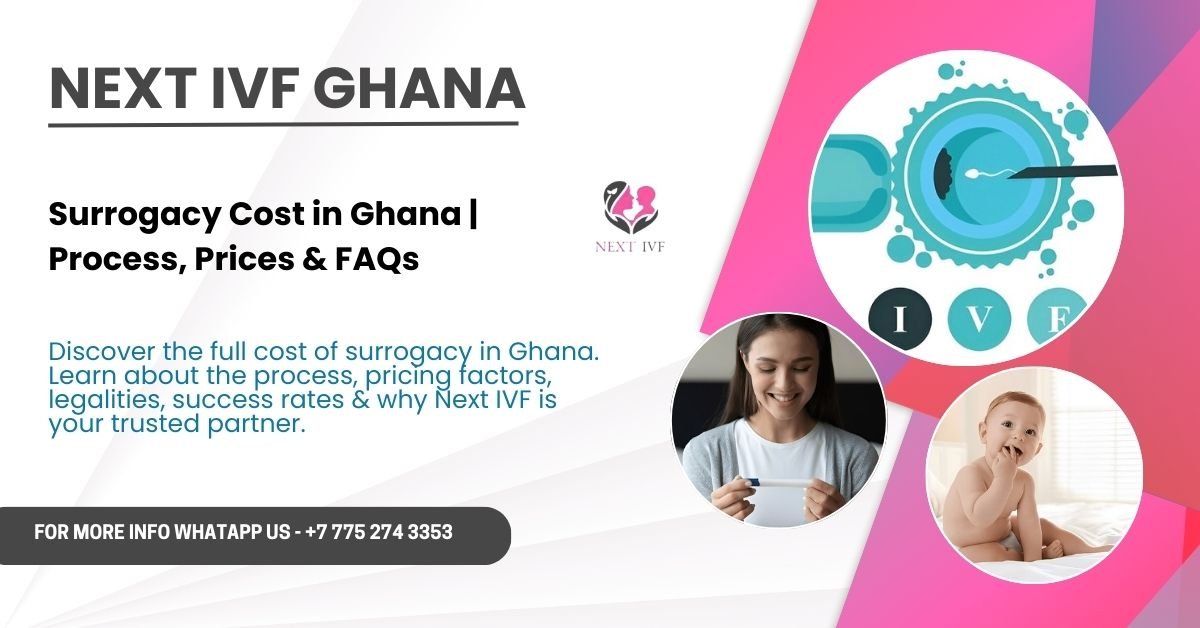Surrogacy Cost in Ghana
The journey to parenthood is unique for every individual and couple. For some, biological challenges or medical conditions may make natural conception or pregnancy impossible. In such situations, surrogacy has emerged as a beautiful solution a process where another woman carries and delivers a child for someone unable to do so. In Ghana, the demand and awareness for surrogacy are steadily growing, supported by medical advancements and evolving societal acceptance.
Surrogacy in Ghana is now more accessible than ever before. With several clinics offering safe and reliable services, couples can find both hope and help within the country. Whether you’re facing infertility, health complications, or are a same-sex couple hoping to start a family, surrogacy provides a pathway to fulfill your parenting dreams.
One of the key aspects of this journey is understanding the surrogacy cost in Ghana. Financial planning is essential, and having transparent information about expenses can help reduce stress and improve decision-making. This article will walk you through what surrogacy is, how it works in Ghana, what it costs, factors that affect the price, and what success looks like in this process, all explained in a simple, human, and friendly tone.
What is Surrogacy?

Surrogacy is an arrangement where a woman, called a surrogate, agrees to carry a pregnancy for another person or couple. After giving birth, the baby is handed over to the intended parents, who will raise the child. Surrogacy becomes an option when someone cannot carry a pregnancy due to medical reasons, infertility, or because they are part of the LGBTQ+ community and want a biological child.
There are mainly two types of surrogacy:
- Traditional Surrogacy – The surrogate’s own egg is used, meaning she is genetically related to the baby. This method is less common now due to legal and emotional complexities.
- Gestational Surrogacy – The surrogate has no genetic link to the baby. The embryo is created using the egg and sperm of the intended parents (or donors) and is implanted in the surrogate’s womb. This is the most common and widely accepted form of surrogacy in Ghana and around the world.
In Ghana, surrogacy is gradually becoming more organized and accepted. Most fertility clinics focus on gestational surrogacy for legal safety and emotional clarity. The process involves several steps, from finding a suitable surrogate and conducting medical evaluations to creating the embryo through IVF, transferring it to the surrogate, and supporting her throughout the pregnancy.
While surrogacy is emotionally rewarding, it also involves medical, legal, and ethical considerations. That’s why working with an experienced clinic and understanding the entire process thoroughly is crucial before you begin. For many, this path leads to the precious joy of parenthood.
Step-by-Step Surrogacy Process in Ghana
Surrogacy is a beautiful journey that helps create families when natural conception is not possible. Here’s a friendly guide to understanding how surrogacy in Ghana typically works:
1. Initial Consultation and Counseling
The journey begins with a meeting at a trusted fertility clinic or surrogacy agency. Both the intended parents and the surrogate receive counseling. This ensures everyone understands the emotional, medical, and legal aspects involved. The doctors explain the full process, including responsibilities, risks, and expectations.
2. Health Checkups and Medical Screening
Medical tests are conducted for the intended parents and the surrogate. These screenings rule out infections or genetic issues and check the surrogate’s uterus to ensure she can safely carry a baby. This is a vital part of building a healthy pregnancy foundation.
3. Legal Agreement
Legal clarity is essential in Ghana surrogacy clinics. A legal expert helps draft a surrogacy contract that defines roles, compensation (if any), rights, and responsibilities. This agreement protects all parties and is mandatory in ethical surrogacy practices in Ghana.
4. Surrogacy Procedure and Embryo Creation
Eggs are retrieved from the intended mother or an egg donor, and sperm from the intended father or a donor. These are fertilized in the lab to form embryos. This is the core medical process in surrogacy in Ghana, carried out in modern Surrogacy labs.
5. Embryo Transfer to the Surrogate
When a healthy embryo is ready, it’s gently transferred into the surrogate’s uterus. This simple procedure is done in a clinic setting and involves minimal discomfort. Hormonal support is given to ensure the best chance of successful implantation.
6. Pregnancy Monitoring
After about two weeks, a pregnancy test confirms if the surrogate has conceived. Once positive, the surrogate’s health is closely monitored through regular scans, check-ups, and blood tests. Intended parents are kept informed and may participate in milestone appointments.
7. Emotional Support
Surrogacy is more than a medical procedure; it’s deeply emotional. Many Ghana surrogacy clinics provide psychological counseling for both the surrogate and the intended parents. Open communication and mutual respect are encouraged throughout the journey.
8. Delivery of the Baby
When the time comes, the baby is delivered at a reputable hospital under expert care. The intended parents are often present for this life-changing moment. The surrogate hands over the baby as agreed, with love and professionalism.
9. Legal Handover and Documentation
Legal documentation follows after the baby’s birth. The baby’s birth certificate is issued in the name of the intended parents. The legal system in Ghana supports surrogacy and ensures that the process is completed without complications.
10. Postnatal Care
After delivery, the surrogate receives full medical and emotional support. The intended parents begin a joyful new chapter with their child. The experience of surrogacy in Ghana is made smoother and safer through compassionate care and strong legal backing.
Surrogacy Cost in Ghana
The surrogacy cost in Ghana is significantly more affordable than in many Western countries, making it a popular choice for both local and international couples. While the cost varies depending on the clinic, the surrogate’s needs, legal services, and any additional IVF procedures required, the overall expense is still within a reasonable range for most middle- and high-income families.
The total cost usually includes medical procedures like IVF, compensation to the surrogate mother, legal contracts, medical care during pregnancy, delivery charges, and sometimes accommodation and travel for the surrogate. Some clinics offer all-inclusive packages, while others may charge separately for different services.
Let’s look at the average cost breakdown in Ghana:
| Service Component | Approx. Cost in USD |
| IVF Procedure (with intended gametes) | $2,500 – $3,300 |
| Surrogate Mother Compensation | $2,100 – $2,900 |
| Legal Documentation & Agreements | $420 – $670 |
| Medical Tests & Pregnancy Care | $670 – $1,000 |
| Delivery & Hospital Charges | $500 – $850 |
| Total Estimated Surrogacy Cost | $5,800 – $8,800 |
The following is the table of expenses involved in the procedure of IVF packages at Next IVF Ghana:
| Destination Country | Surrogate & Maternity Cost (USD) |
| Surrogacy cost in Ghana | $35,000 – $55,000 |
| Surrogacy cost in Ukraine | $50,000 – $80,000 |
| Surrogacy cost in the USA | $150,000 – $200,000 |
| Surrogacy cost in Ghana | $45,000 – $75,000 |
Factors Affecting Surrogacy Cost in Ghana
- Type of Surrogacy (Gestational or Traditional)
Gestational surrogacy, where the surrogate has no biological link to the child, is costlier than traditional surrogacy due to IVF procedures. However, it’s legally and emotionally safer, which is why most clinics prefer this method despite the higher cost. - Medical Condition of Intended Parents
If the intended parents require additional fertility treatment, donor eggs, or sperm, it increases the total cost. Some may also need embryo freezing or multiple IVF attempts, which adds to the budget. - Surrogate’s Health and Needs
Every surrogate goes through medical screenings and needs ongoing care. If she requires special support or has high-risk pregnancy concerns, costs may go up. Better care improves safety for both baby and surrogate. - Legal Services and Contracts
Legal contracts are essential to protect the rights of all parties. Hiring lawyers for agreements, guardianship documentation, and birth registration is part of the cost, especially in countries like Ghana, where laws are still evolving. - Clinic Reputation and Facilities
Top fertility centres may charge more due to better labs, experienced doctors, and international protocols. However, their higher success rates and safety make them worth the investment for many couples.
Why Choose Ghana for Surrogacy?

Ghana may not be the first city that comes to mind when thinking of fertility treatment, but it’s quickly becoming a global hub for assisted reproduction. There are several reasons why people are traveling across continents to get Surrogacy in Ghana and why they trust it for some of the most emotional and sensitive decisions of their lives.
First, Georgia’s healthcare system is increasingly geared toward international patients. Many of the fertility clinics in Ghana are accredited, transparent, and meet or exceed European medical standards. They follow ethical guidelines and offer procedures that are legal, safe, and affordable.
One of the biggest attractions is cost-effectiveness. Surrogacy treatments in Ghana are often 40-70% cheaper than in the U.S. or Western Europe, without compromising on quality. This makes the Best Surrogacy Centre in Ghana an economical and reliable option for couples facing budget constraints.
Ghana is also known for being a welcoming and safe city. English is widely spoken in medical environments, and many clinics have multilingual staff to help bridge communication gaps.
Success Rate of Surrogacy in Ghana

The success rate of surrogacy in Ghana is closely linked to the IVF success rate, which has steadily improved thanks to better technology, experienced professionals, and strict protocols. On average, the success rate of IVF embryo implantation through surrogacy is between 50% to 70% per cycle, depending on the clinic and the health of the egg and sperm used.
Gestational surrogacy using healthy embryos from young donors or intended parents typically has higher success. If pre-implantation genetic testing (PGT) is used to select healthy embryos, chances increase even more. The age of the intended mother doesn’t affect the pregnancy because the surrogate carries the baby, but good-quality eggs are still important.
Another factor is the surrogate’s health and her ability to carry a full-term pregnancy. That’s why most clinics carefully select women who are between 21–35 years old, have previously given birth, and are medically fit.
The IVF labs in Ghana’s top clinics now use advanced incubation techniques and embryo freezing, which allows couples to try again if the first attempt fails. Emotional support and clear guidance from clinics also play a role in reducing stress and improving outcomes.
Overall, surrogacy in Ghana offers a hopeful and effective option for couples who are unable to carry a pregnancy. With increasing awareness, improved facilities, and supportive medical teams, more and more intended parents are achieving their dream of having a child through surrogacy in Ghana.
Why Trust Next IVF Ghana?
Dealing with infertility can be one of the toughest challenges in life, emotionally and physically. But you don’t have to face it alone. At Next IVF Georgia, we blend the latest medical technology with genuine care and understanding to help you fulfill your dream of becoming parents.
Our center is committed to offering personalised fertility treatments designed just for you. We know how important starting or growing your family is, and our team, including IVF specialists, gynaecologists, embryologists, and caring support staff, is here to guide you at every step.
Why choose Next IVF Ghana as your fertility partner?
- Comprehensive treatments: From IVF, IUI, frozen embryo transfer to egg and sperm donation, laparoscopy, ICSI, PGD, and male infertility treatments, we cover it all with advanced methods.
- High success rates: Our experienced doctors and proven protocols increase your chances of success.
- Affordable care: We believe quality fertility treatment should be available to everyone, so we offer top-notch care at prices that won’t break the bank.
Don’t wait any longer to start your journey to parenthood. Reach out to Next IVF Ghana today at +91 7827636596 or email us at info@nextivf.com. Together, we’ll turn your hope into a happy family, with the right center, expert doctors, and heartfelt care.
Conclusion
Choosing surrogacy is a deeply emotional and personal decision. For many couples, it’s not just a medical option, it’s a chance to fulfil their dream of holding their baby in their arms. In Ghana, surrogacy is gradually becoming more accessible, affordable, and reliable. With the growing number of ethical fertility clinics, experienced specialists, and caring surrogate mothers, the path to parenthood has become more possible than ever before.
Understanding the surrogacy cost in Ghana helps remove uncertainty and allows you to prepare with confidence. While the journey may involve financial planning, legal steps, and emotional commitment, it leads to one of life’s most beautiful rewards: a child of your own.
Whether you’re from Ghana or another country, if you’re ready to explore surrogacy, you’re not alone. Thousands of families around the world have walked this path and found happiness. With the right clinic, the right support, and the right mindset, your journey can be a joyful and successful one too.
Your dream of becoming a parent is valid, and in Ghana, it’s possible. All you need is the right information, the right team, and the courage to take the first step. Parenthood might be closer than you think.
FAQs (Frequently Asked Questions)
1. Is surrogacy legal in Ghana?
Surrogacy is not fully regulated by a specific national law in Ghana, but many clinics operate ethically with proper legal agreements. It’s important to consult a lawyer and work with a licensed fertility centre.
2. How much does surrogacy cost in Ghana?
The total surrogacy cost in Ghana ranges from GHS 70,000 to 105,000 ($5,800 – $8,800), depending on the clinic, medical needs, and surrogate compensation.
3. Who can opt for surrogacy in Ghana?
Couples facing infertility, women with medical conditions preventing pregnancy, and same-sex couples (in select cases) may choose surrogacy, depending on clinic policies and local regulations.
4. Can international patients do surrogacy in Ghana?
Yes, many clinics in Ghana accept international patients. Some even offer travel and accommodation assistance for couples coming from abroad.
5. How is the surrogate selected?
Clinics screen surrogate mothers based on age, health history, previous childbirth experience, and emotional readiness. Only qualified women are approved for the process.
6. What happens if the surrogate doesn’t get pregnant in the first cycle?
If the first IVF attempt fails, clinics may try another embryo transfer using frozen embryos. Many packages cover 1–2 cycles, and doctors review results before recommending next steps.
Read Also:
- IVF Cost in Pakistan: Affordable Treatment, Success Rates & Complete Guide
- PGD Cost in Pakistan: Complete Guide to Procedure, Success Rate & Next IVF
- IVF Cost in Ghana: Everything You Need to Know About Prices, Process & Success Rates
- Surrogacy Cost in Ghana: A Complete Guide to Process, Prices & Success Rates

